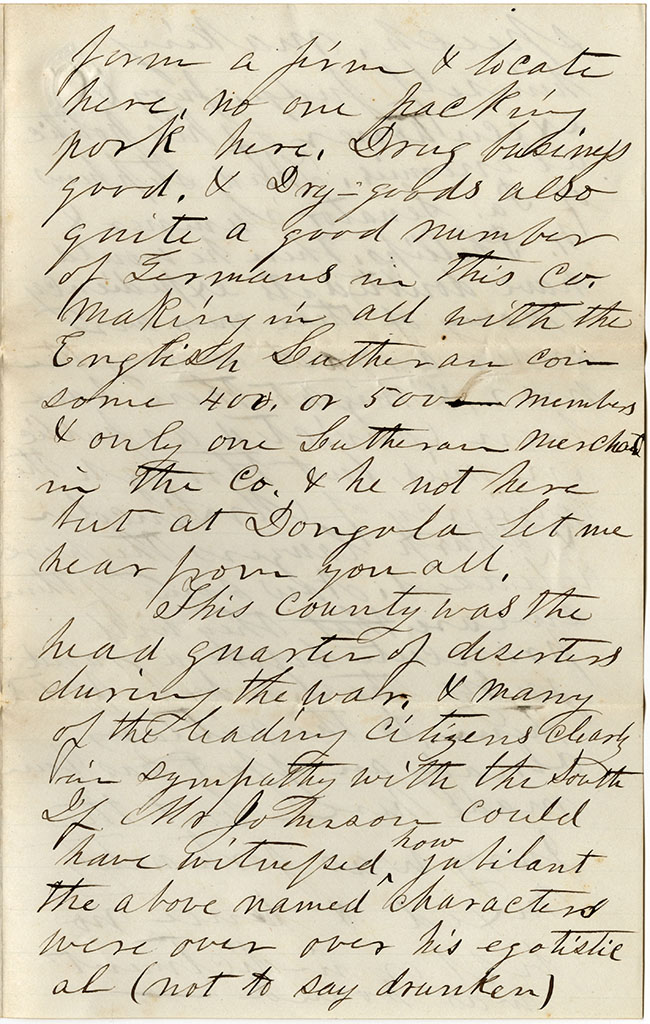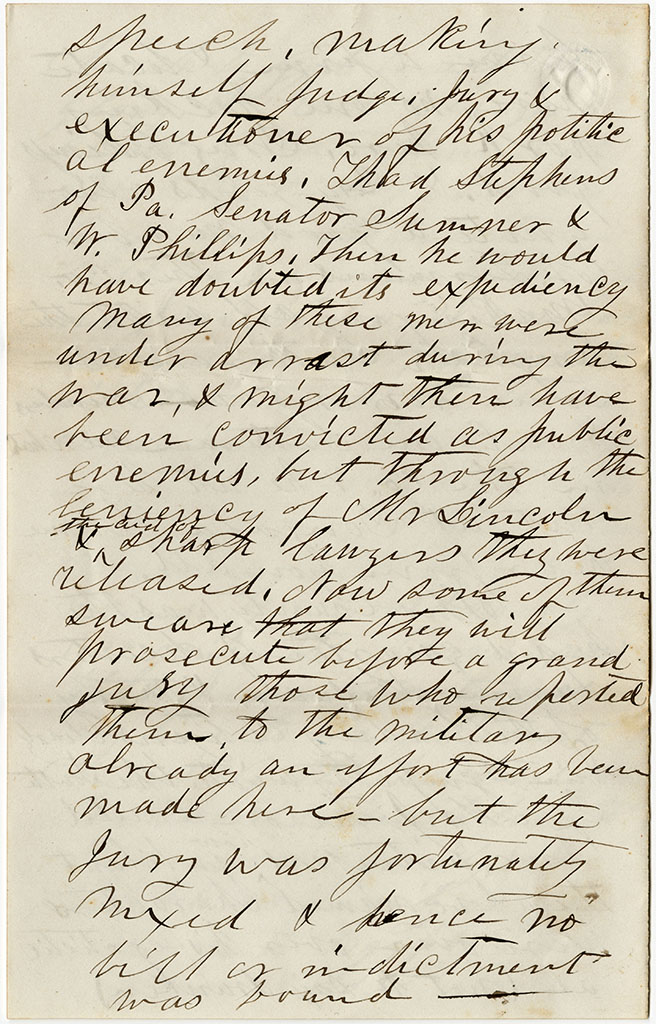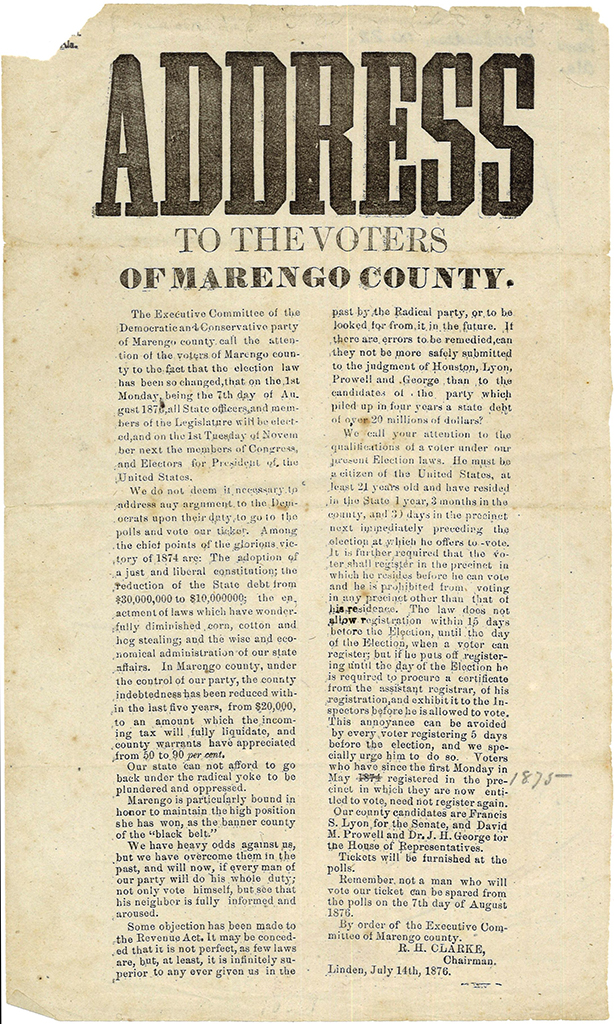Radicals
The political atmosphere of the Reconstruction era was dominated by the presence of the Radical faction of the Republican party, which became the prime target of Southern Democrats’ anger and frustration.
It was the Radicals who pushed through the Reconstruction Acts which started military Reconstruction — measures that Pres. Johnson, an erstwhile Democrat, did not approve of. They were also behind the president’s impeachment, which did not lead to his removal but helped ensure he was not even on the ballot for the Democrats in the next election. Radical Republican and former Union general Ulysses S. Grant was elected to replace him in 1868.
The Johnson Problem
This county was the head quarters of deserters during the war, & many of the leading citizens clearly in sympathy with the South If Mr Johnson could have witnessed how jubilant the above named characters were over his egotistical (not to say drunken) speech, making himself Judge, Jury & executioner of his political enemies, Thad Stephens of Pa. Senator Sumner & W. Phillips, then he would have doubted its expediency.
From a Mar. 1866 letter from D. Spreacher of Illinois to his friend George in Iowa, recounting a wild impromptu speech given locally by Pres. Johnson. He says that many in the audience were sympathetic to the Confederacy and were very happy to hear the President rebuke popular Radical Republican figures.
Wade Hall collection of Civil War materials, MSS.4273 (Digitized item) (Info about the collection)
removing the cause
Some of the Radical press are endeavoring to delude the people with the idea that the success of the impeachment plot will give quiet to the country by removing the cause, as they allege, of all the agitation of the public mind and the disturbance of its business interests — that is, the President — who, they have the temerity to [assume/accuse?], was responsible, though shorn of nearly all of his executive functions, for the present evils which we suffer.
From an 1868 article discussing the potential impeachment of Pres. Johnson. It argues against the claim of a New York Times article that getting rid of him would solve all the country’s problems.
“The Quiet of Despotism,” Southern Advertiser (Troy), Mar. 17, 1868.
facts or falsehoods
Our Radical taskmasters, who require brick at our hands without first providing us with straw, have reversed the old Conservative fashion of dispensing justice.
Witness the infamous Ku-Klux Bill! It was designed and passed as punitory measure against the South. And now that the punishment has been inflicted, the Radical conspirators are sending Smelling Committees, composed almost entirely of violent, inflamed and prejudiced enemies of the South to nose among the highways and byways of our persecuted land for either facts or falsehoods (it matters not which,) to justify their acts of gross injustice and wrong.
From an 1871 editorial railing against Radical Republican legislation. It says Congress wants to justify the KKK Act by sending spies to the South to find — or invent — evidence of wrongdoing.
Ironically, they begin the article with a reference to a familiar Bible story about the Israelites being enslaved to the Egyptians (Exodus 5).
“Radial Justice,” Clarke County Democrat (Grove Hill), Aug. 10, 1871)
Political Coalitions
Resolved 2nd. That in carrying out this position we will place upon the county ticket a liberal Republican, in fact, and name and that we do hereby ask of that organization to designate their own man, to whom we pledge our support.
From an 1872 Madison County Democratic party document copied by attorney and local political operative Septimus D. Cabaniss. It calls for a coalition of all who are “in opposition to Grant’s administration” — that is, the Radical Republicans.
Nationally, Liberal Republicans formed their own party, and in 1872 they joined with Democrats in running a single candidate against Grant for the presidency: New York newspaperman Horace Greeley. Clearly, similar anti-Radical alliances were also being made in state and local elections.
S. D. Cabaniss papers, MSS.0252 (Digitized item) (Info about the collection)
by the free ballot
Perished Through its own corruption 5 P.M., November 3rd, 1874, in Alabama, by the free ballot of the virtuous people it outraged the detestable body of Alabama Radicalism.
It clutched in its leprous grasp the State’s pure judiciary, and bedraggled it in slime until its spotless ermine was black and offensive as Radicalism’s own adored Africa. It transformed the State’s great Legislature into a howling Pandemonium of indecency and plunder, an unconvicted Penitentiary of thieves, blackguards and felons…
From an 1874 “obituary” for the Radical arm of the state Republican party. It describes them as figuratively diseased and dirty, and depicts the legislature as chaotic and presided over by criminals.
“Obituary: Alabama Radicalism,” Henry County Register (Abbeville), Nov. 13, 1874.
Redemption
The era of the Radicals eventually gave way to the era of the Redeemers, Southern Democrats who hoped to re-take control of their local and state governments. This would effectively allow them to walk back some of the concessions they had made to civil rights, often under duress, to rejoin the Union. It would mean “redemption.” For Alabama, this came in 1874. For the region as a whole, it was a result of the 1876 election.
anomalous state
The anomalous state of affairs at Montgomery continues. Gov. Lewis and other officers of the State Government — all Radicals — holding their offices at the hands of the Democrats and Conservatives in the Legislature sitting in the Capitol, who counted the votes and announced their election, occupy official rooms in the Capitol, and yet all recognize, as the legal Legislature, the Radical Rump, which virtually confessed its own illegitimacy by assembling in another and unusual place, the U.S. Court Room…
From an article on political uncertainty in Montgomery after the 1872 election. Competing legislatures were meeting separately — Democrats at the capital building, Republicans at the federal courthouse. The Republicans would eventually take power.
“The Situation at Montgomery,” Democrat (Huntsville), Dec. 6, 1872.
the ruin of defeat
We have been ingloriously defeated, “horse, foot and dragoons,” in our National vote, and in the vote for our State officials. No matter what may have been the causes that led to it, whether they palliate or give additional cause for regret, the fact that we have been defeated is a humiliating confession that truth compels us to make. Amid the ruin of defeat, and the prospect of additional oppression, the question arises, what is our duty? Mourning over the result does not benefit us, nor does it change our position. Despondency does no good, and will not lighten the burdens to be imposed. It is our duty to “organize victory” for the next campaign.
From an article on the 1872 reelection of Pres. Grant. It argues that wallowing in defeat isn’t helpful; rather, Democrats must start planning for the 1874 election.
“1874–Organize Victory,” Shelby County Guide (Columbiana), Nov. 14, 1872.
Consolidating Power
Our state can not afford to go back under the radical yoke to be plundered and oppressed. Marengo is particularly bound in honor to maintain the high position she has won, as the banner county of the ‘black belt.’ We gave heavy odds against us, but we have overcome them in the past, and will now, if every man of our party will do his whole duty; not only vote himself, but see that his neighbor is fully informed…
A July 14, 1876, flier targeting Democratic voters in Marengo County ahead of the state election, the first since the state’s “redemption.” It says that the only argument the party needs is to point out the positive changes it has made since its “glorious victory” two years prior.
Among those changes is the 1875 state constitution. This document retained elements of the 1868 constitution like protections for voters of color, but it also established segregation in the education system.
Alabama vertical files, MSS.3437 (Info about the collection)
hallelujah
Tilden and Reform!
The Country Redeemed After A Long Reign Of Misrule!
Glory! Hallelujah! The Day of Jubilees Has Come!
A Glorious Dawn After A Long, Long, Weary Night!
From a graphic celebrating the apparent election of Samuel Tilden, the Democrat, to the U.S. presidency in 1876. It proclaims the country’s redemption and celebrates the end of a “long, weary night.”
“Tilden and Reform!,” North Alabamian (Tuscumbia), Nov. 10, 1876.
his Fraudulency R. B. Hayes
It is now pretty definitely settled that Hayes is to be duly declared President by the Commission in their quasi judicial and quasi political, three-legged, one-sided action. The legal mind of this tribunal has made its decision upon a process of reasoning which has legalized fraud, canonized swindling and defeated justice. So by this Commission, not by the people, his Fraudulency R. B. Hayes is to be lawful and rightful proprietor of Federal patronage for the next four years.
From an article lamenting the final outcome of the Compromise of 1877 that gave Rutherford B. Hayes, the Republican, a victory in the 1876 election and thus the presidency. Despite these harsh words, it goes on to say anyone who says Hayes is not President is “not true patriot.”
“[It is now pretty definitely settled],” Our Mountain Home (Talladega), Feb. 21, 1877.



